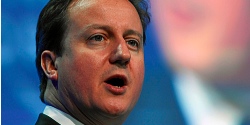Fair use rights in the UK... it’s the 80s all over again
Feargal Sharkey describes fair use as “intellectual masturbation” and a blind alley that has triggered angst and insecurity ever since Cameron said it gave companies the breathing space to create new products and services. Saskia Walzel seeks to shed light on fair use

Image: CC-AT-SA Flickr: World Economic Forum
Prime Minster Cameron mentioned ‘fair use provisions’ when announcing a review of the UK’s copyright framework to make it more innovation friendly. The Independent Review of IP and Growth, led by Prof Ian Hargreaves, set out to investigate what the benefits of ‘fair use’ exceptions to copyright may be.
What has been termed fair use rights essentially allows the copying of copyrighted works without the permission of the copyright owner. While the UK has a number of fair use rights, called fair dealing, for things like research and news reporting, UK copyright law only provides consumers with the fair use right to time-shift broadcast. That is, to record broadcasts to watch/listen at a later time, and the back-up of software in certain circumstances.
Essentially it is illegal to copy copyrighted content for personal use under UK law: the back-up of music, film and e-books is currently illegal and so is format-shifting, for example copying music into different formats to listen to on different devices.
Fair use by consumers is legal in most other countries through a general fair use defence or private use exception, and technology companies develop products around these user rights. Format-shifting falls under the fair use defence in the US, and Apple has developed the iPod and iPlayer on the basis that consumers format-shift their CD collection into digital.
This leads to the absurd situation where UK consumers can buy hardware and software that is designed specifically for something that is illegal in this country. Most UK consumers are not even aware that format-shifting your CD is illegal: 85 percent of consumers think it is legal, and once told that it is actually not legal, 91 percent said that it should be legal.
So does it matter that fair use is largely illegal in the UK, and that thousands of consumers infringe copyright. Does it really matter that I infringe copyright on a grand scale when backing up my 1,000+ MP3s? Who cares if I illegally convert my pdf e-books into Kindle format? After all no consumer who has copied for personal use what they have bought has ever been sued for copyright infringement. And has this not all been done and argued out before?
In 1988, the High Court found Amstrad was not responsible for copyright infringement committed by consumers using Amstrad’s twin cassette deck and Thatcher updated copyright law for the home taping age by introducing the time-shifting exception into UK law.
The long term effects of introducing a fair use right for time-shifting into UK copyright law? Well, home taping did not kill music, TV got better, and Alan, who had made millions developing and manufacturing innovative consumer hardware, was made Lord Sugar.
Courtesy of Amstrad, BSkyB introduced consumers to the convenience of digital video recorders (DVRs). Relying on the time-shifting exception, consumers now store digital TV programmes on hard disk so that they can be replayed at a later time, making the most of their +box premium subscription service. Around nine million DVRs have been sold since 2000 and more than a quarter of UK households now own a DVR. BSkyB customers accomplish around 4.4 billion time-shifts per year and Ofcom have hailed DVRs as having had a profound effect on consumers TV viewing habits.
What if Cameron were to introduce a fair use right for consumers to copy, shift and back-up for their own personal use? Would it prompt UK companies developing new markets for consumers to enjoy music, film and books using the latest technology? Most likely, and they would not be sued into oblivion for trying.
There are good reasons why Alan decided to innovate within the time-shifting exception, rather than relying on his twin deck court victory. According to the court, Amstrad was not liable for copyright infringement by consumers only because its twin deck could be used for legitimate purposes.
But DVRs are sold for the sole purpose of time-shifting broadcast, and are marketed as such. Without the time-shifting exception Alan might have never become Lord Sugar and BSkyB’s +box subscription business model would have been just an idea that the in-house legal team quickly suffocated.
Hargreaves recently met the young entrepreneurs and start-ups congregating around the Silicon Roundabout. Basil Safwat from Minified apparently got a round of applause for standing up at the end saying that he was kind of annoyed he came tonight, because he realised that UK copyright can stop him from making “cool stuff”. That is especially true if cool stuff involves consumers copying to listen and watch what they have bought in different formats and numerous devices.
Twelve years after Thatcher made copyright law home taping friendly, it is about time copyright law is made digital innovation friendly. And then the Silicon Roundabout folks can get on with developing the next big thing.
Saskia Walzel is policy advocate at Consumer Focus. She tweets as SaskiaWalzel
If you would like to join the debate, come to the Consumer Focus/deapgg Event: The Government's IPR review and fair use rights 8 March, 6.30-8.30, House of Commons, Committee Room. RSVP: sophianpickles+deevents@gmail.com
Share this article











Comments

Latest Articles
Featured Article
Schmidt Happens

Wendy M. Grossman responds to "loopy" statements made by Google Executive Chairman Eric Schmidt in regards to censorship and encryption.
ORGZine: the Digital Rights magazine written for and by Open Rights Group supporters and engaged experts expressing their personal views
People who have written us are: campaigners, inventors, legal professionals , artists, writers, curators and publishers, technology experts, volunteers, think tanks, MPs, journalists and ORG supporters.






Comments (0)